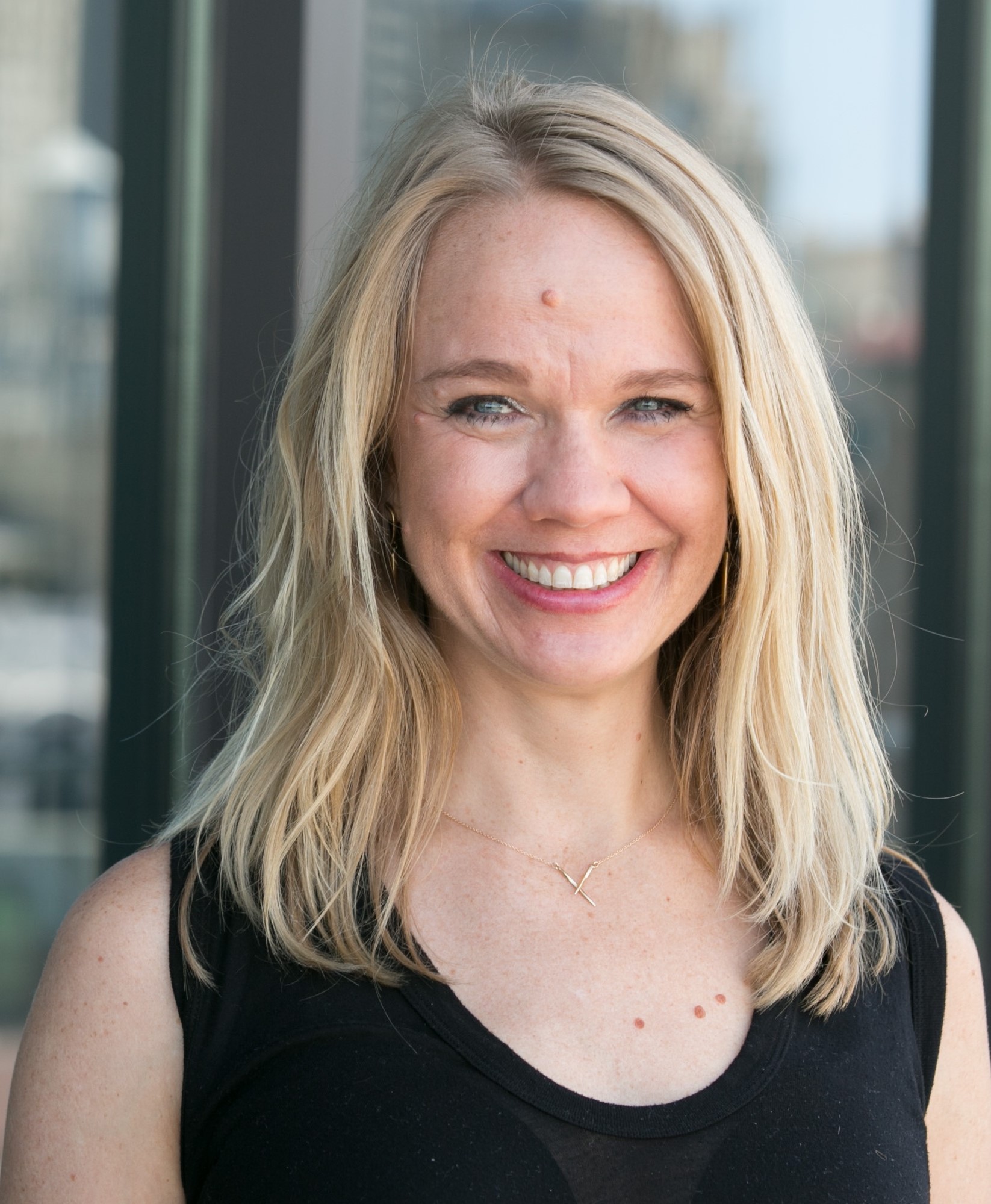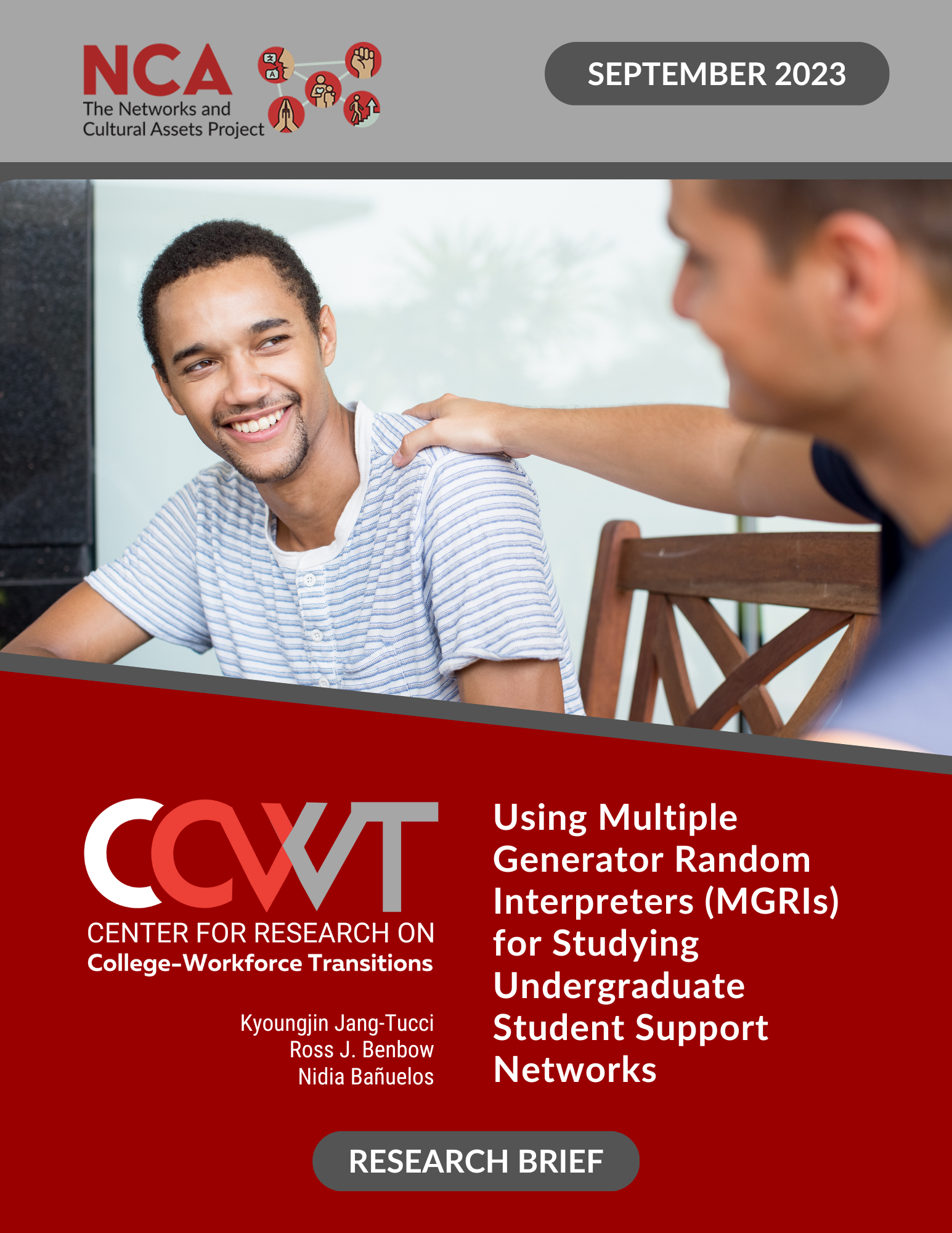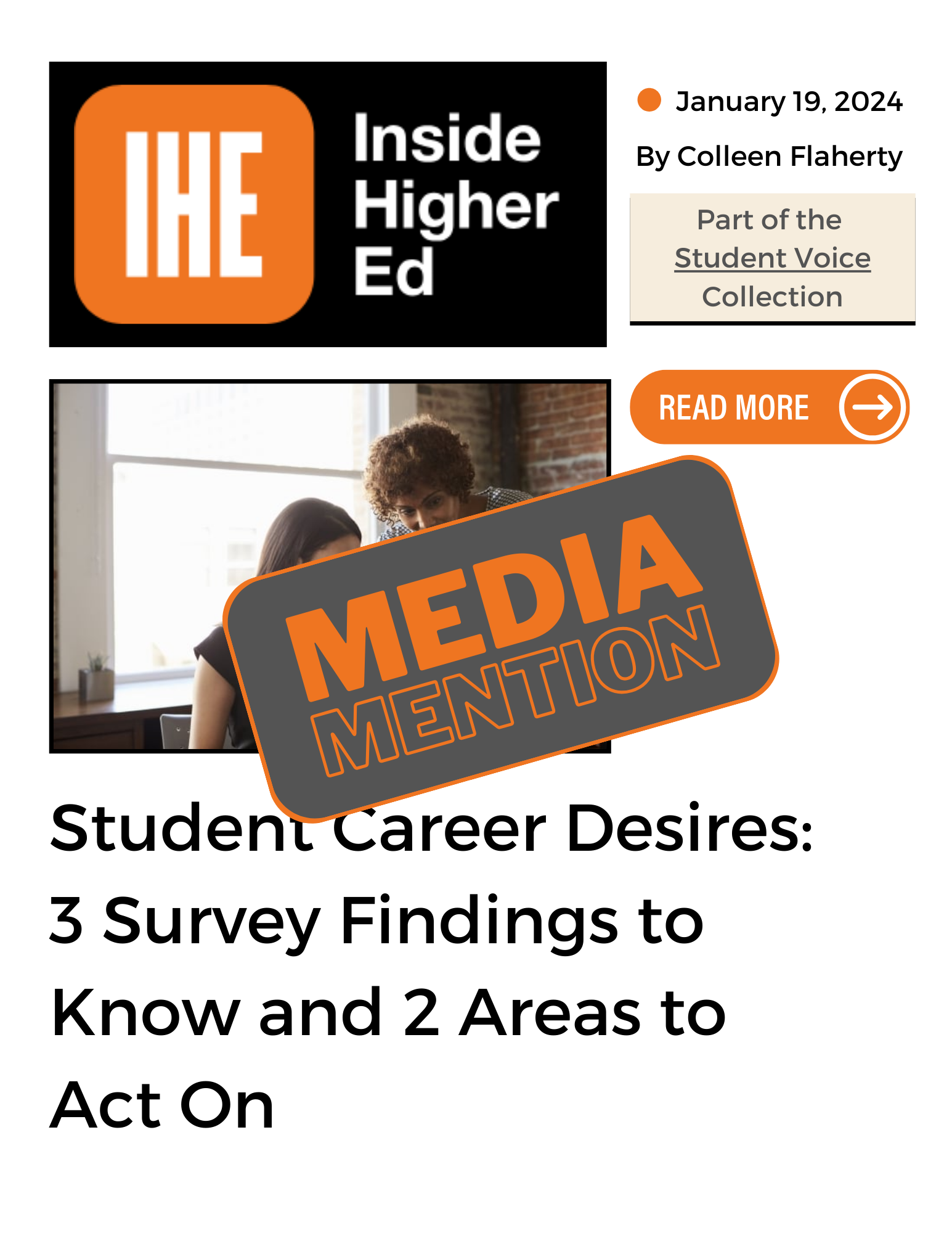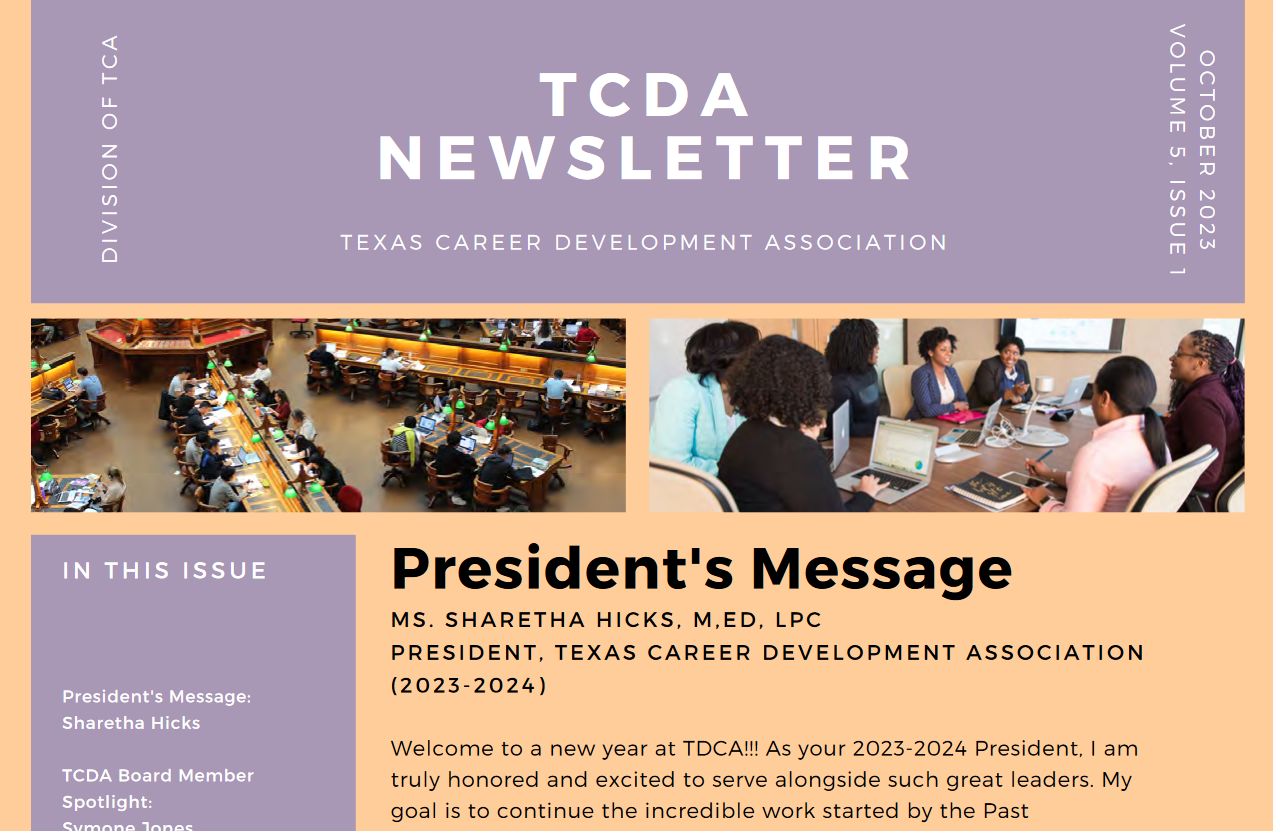|
|
Dear CCWT Community,
One of our leadership team’s biggest takeaways from our CCWT 2023 Fall Conference was that we have an amazing community of practitioners, scholars, and early career professionals – and that we are all better when we are in conversation and collaboration! To that end, we have been working hard to launch 3 exciting initiatives:
|
|
|
|
1 - We have a newly developed CCWT Affiliate Program designed to grow a network of highly engaged collaborators working to improve employment outcomes for individuals.
2 – We are excited to welcome our 2024 cohort of Early Career Scholars who will participate in our newly redesigned ECS Program designed to better meet the needs of our ECS scholars and grow our community dedicated to promote the career development and wellness of students and other individuals who are transitioning from education to work.
3 – We have made exciting updates to our CCWT website. We are particularly excited to have dedicated content areas to help you easily find the topics and resources most relevant to you as an instructor, researcher, practitioner, and/or student.
|
|
|
|
We also have a new searchable video webpage that includes webinars and seminars across a broad range of topic and focus areas.
This winter newsletter features many updates from CCWT plus incredible opportunities to learn from fellow scholars and practitioners. We hope you’ll join us!
|
|
|

|
Dr. Mindi Thompson
CCWT Director
|
|
|
|
|
|
|
|
Spring 2023 Seminar Series
|
|
|
|
|
|
March 11th at 11am CST
Kara Woods, Socially Disadvantaged Farmers & Ranchers Policy Research Center - “Land Grant Institutions & the Opportunity of Post-Graduate Studies.”
Land grant institutions are a pivotal piece to the opportunity for higher learning in America. In this webinar, we will look at the past, present, and future landscape of post-graduate opportunities at land grant institutions in three states; Alabama, Georgia, and Mississippi. The history and difference between 1862 and 1890 Morrill Act land grant institutions will be discussed as well as how internships, scholarships, and the end of affirmative action play a role in continued education.
|
|
|
|
|
|
March 13th at 12:30pm CST
Erika Willis, University of Wisconsin-Madison - “empowHER: A Mentoring Program for Women in the WI Building Trades.”
This webinar introduces empowHER Wisconsin Women in the Building Trades, which was established in 2019 to normalize the role of, support, and retain women in the construction industry and recruit more women into union construction careers.
Join Erika Willis as she discusses the scholarship regarding mentoring as a key component of achieving this vision, discuss the collaborative process of designing and launching this empowHER mentoring program, and offer an activity to demonstrate the unique issues women in this industry face.
|
|
|
|
|
|
April 9th at 11am CST
Dr. Taewon Kim, University of Florida - “Racialized Poverty Among College Students: Intersecting with First-Generation College Students Status and Paid Internship Opportunities.”
Researchers and career counselors have become increasingly interested in understanding college students’ experiences of poverty and identifying the role of paid internship opportunities in poverty experiences based on structural, cultural, and historical dynamics.
Drawing from data from CCWT, Dr. Kim will explain multidimensional poverty and display different structures and natures of poverty that college students experience across racial identities. She will also explain if first-generation college students are more vulnerable to racialized poverty and if paid internship opportunities would alleviate poverty experiences and provide reflection questions and future directions highlighting ways to support invisible student groups with intersecting identities.
|
|
|
|
April 26th at 12:30pm CST
Anderson Lee, CompTIA - “DeafTEC Ready: Unlocking Potential Among Deaf & Hard-of-Hearing Stu.”
For the deaf and hard-of-hearing, getting considered for employment opportunities is a longstanding challenge. In the tech industry, their participation is even less so. What accounts for their under-representation? How can employers seeking tech talent be engaged? Which approaches work better than others?
Session attendees, especially career services professionals and any employers present, will learn about CompTIA’s partnership with the Rochester Institute of Technology’s National Technical Institute for the Deaf to certify and place deaf and hard-of-hearing students into paid training-related roles. Obstacles, setbacks, and successes will be shared, and as approaches continue to be developed as well as tried, session attendees will also be invited to share their experiences in a collegial and open setting.
|
|
|
|
|
|
|
|
|
|
|
|
|
|
|
|
Does your work align with CCWT’s mission? Would you like to be part of a community that collaborates to improve career and wellness outcomes for students?
|
|
|
|
Her, P. (2024). Radical Hope: Career Interventions for Underrepresented Students in Higher Education. Early Career Scholars Program. Center for Research on College-Workforce Transitions. University of Wisconsin–Madison, Division of Continuing Studies.
This brief discusses the experiences of underrepresented students in higher education and proposes the use of radical hope as a career intervention to support students in their career exploration process. It includes examples of career interventions that employ a radical hope framework.
|
|
|
|
Delgado, V. (2024). Supporting Immigrant-origin College Students’ Transition to the Workforce: Policy Recommendations for Postsecondary Institutions. Early Career Scholars Program. Center for Research on College-Workforce Transitions. University of Wisconsin–Madison, Division of Continuing Studies.
This research brief provides an overview of findings from research conducted with immigrant-origin Latino/a college graduates. The study sought to understand how the COVID-19 pandemic and immigration related factors shaped this group’s transition from college to the workforce. Longitudinal in-depth interviews were used to explore academic setbacks due to the COVID-19 pandemic, experiences with employment after college, and newfound family responsibilities once in the world of work.
|
|
|
|
Chin, M. Y. (2023). Redefining Student Success: When College Students Choose to Leave. Early Career Scholars Program. Center for Research on College-Workforce Transitions. University of Wisconsin–Madison, Division of Continuing Studies.
This brief provides overviews the types and contributions of college student transition programs towards student success in four-year institutions, in the context of dominant and critical theoretical frameworks on student retention and success. It further discusses the potential for institutions to structurally augment their support for students who are contemplating leaving college. Recommendations for policy, practice, and research are discussed.
|
|
|
|
Liu, R., & Glave, C. (2023). The Alignment Between Internship, College Major, & Career Plan: Differential Experiences Across Gender, Race, & Major Groups. Center for Research on College-Workforce Transitions. University of Wisconsin–Madison, Division of Continuing Studies.
This study proposes a novel tripartite alignment framework for internship studies to investigate alignment among student internship experiences, academic training in major programs, and career plans. Utilizing data from the College Internship Study, we examine demographic and programmatic factors associated with internship-major and internship-career alignment, and how these factors interact to affect overall internship satisfaction.
|
|
|
|
|
|

|
Jang-Tucci, K., Benbow, R. J., & Bañuelos, N., (2023). Using Multiple Generator Random Interpreters (MGRIs) for Studying Undergraduate Student Support Networks. Networks & Cultural Assets Project. Center for Research on College-Workforce Transitions. University of Wisconsin–Madison, Division of Continuing Studies.
This research brief introduces the Multiple Generator Random Interpreter (MGRI; Marin & Hampton, 2007), a method for collecting personal or “ego” network data, as an alternative to traditional name generators and interpreters in social network research. Specifically, we focus on: (1) How MGRIs are different from Traditional Name Generators and Interpreters (TNGIs), and (2) What new insights can be yielded from using MGRIs when assessing college students’ support networks. We answer with a review of social network literature, and then focus on describing research methods and empirical evidence from two studies we have conducted of Latino/a/x/e (hereinafter “Latine”) college students in two U.S. states.
|
|
|
|
|
|
Welcome New CCWT Employees
|
|
|
|
Zeke Lega is an undergraduate political science and communications arts student at the University of Wisconsin-Madison. A Mercile J. Lee Scholarship recipient, Zeke is dedicated to serving his community and supporting his fellow marginalized students. As a Graphic Design and Communications Assistant for the CCWT, Zeke strives to do work that positively impacts his classmates while furthering his professional development and personal growth.
|
|
|
|
Naing Naing is an undergraduate Biology major at the University of Wisconsin-Madison. He is passionate about social research that can support marginalized students. As a refugee and first-generation student, through his role as a Student Research Assistant for the NCA project at CCWT, Naing aims to enhance and expand his research skills to better serve the community. Naing aspires to attend medical school and become a physician-researcher, focusing on bridging the gap in healthcare access for marginalized populations.
|
|
|
|
Olivia Schmidt is an undergraduate Zoology major at the University of Wisconsin-Madison on the pre-veterinary medicine track. Representing her fellow students as a College of Letters and Science Representative on UW's student council, ASM, she is passionate about giving voices to those who are silenced or underheard. As a Student Research Assistant for the NCA project at CCWT, she utilizes this passion to support research on furthering post graduate success for historically marginalized students. It is through this work that she hopes to make positive impacts on educational perspectives and outcomes and her community.
|
|
|
|
Hee Song is pursuing a PhD in Educational Policy Studies and has a keen interest in school-to work transitions, focusing on the evolving skill requirements and performed tasks in various occupations and industries. She is also dedicated to understanding and developing policies that effectively engage both students and faculty.
|
|
|
|
|
|
Teaching 21st Century Skills
|
Dr. Matthew Hora’s Continuing Studies course “Teaching transferable skills in college courses: Developing career readiness and cultural fluency” has opened for registration! Learn how to teach communication, teamwork, critical thinking, and self-motivated learning while examining skills frameworks, instructional design principles and the science behind each of the four skills. With emphasis on how career readiness topics can be embedded in core disciplinary courses and how a cultural view of skills enhances students’ and employers’ abilities to work across cultural differences, you don’t want to miss this affordable professional development opportunity! Cohorts begin March 4, 2024, and April 22, 2024. Register today!
|
|
|
|
Networks & Cultural Assets Project
|
This fall, the Networks and Cultural Assets Project (NCA) team presented collaborative research with partners from the University of Texas El Paso at several conferences. They shared preliminary results from the first round of data collection on STEM students’ social networks and community cultural wealth at the Association for the Study of Higher Education and the Louis Stokes Midwest Regional Center of Excellence (LSMRCE) Annual Conference. The latter brings together students, faculty, and staff who participate in the Louis Stokes Alliance for Minority Participation and are committed to the diversification of the STEM professions. NCA’s postdoctoral fellow, Dr. Trevor McCray, also shared practical applications of NCA’s work with career services professionals at the Southern Association of Colleges and Employers and the Wisconsin Association of Colleges and Employers.
|
|
|
|
Tune In to Strive Out Career Wellness Program
|
The Tuned In Labs team presented the Tune In to Strive Out Career Wellness Program at CCWT’s 2023 Fall Conference, which included preliminary data from participating students. Three partner programs implemented our Tune In to Strive Out with their students during the fall semester. Two programs will implement the program again this semester. To facilitate the training process, an introductory video is available on the Facilitator Training website, allowing interested potential facilitators to participate in the training at their own pace.
|
|
|
|
CCWT Founder Dr. Matthew Hora contributed to Colleen Flaherty’s Student Voice published by Inside Higher Ed on January 19, 2024
|

|
In the piece, titled "Student Career Desires: 3 Survey Findings to Know and 2 Areas to Act On,” Dr. Hora reviewed and provided reactions to the findings of the surveys. In responding to the need for connecting coursework to careers, he states, “Perhaps most significantly, Hora explains, work-integrated learning remains relatively rare in the U.S. compared to peer nations such as Canada and Australia.” Click here to read more of Dr. Hora’s brilliant insight as well as educated opinions from other experts.
|
Dr. Trevor McCray featured in Texas Career Development Association October 2023 Newsletter
|

|
Dr. McCray's article "Springing Forward: Asset-Based DEI Career Programming" discusses the contemporary deficit-based DEI initiatives and provides suggestions for asset-focused alternatives. Dr. McCray affirms that "advancing our lens on programming... could offer a move toward an asset-affirming framework that is cutting-edge in this new era." To read more of Dr. McCray's invaluable article, access the newsletter here.
|
|
|
|
The mission of CCWT is to develop research tools, evidence, and educational programs that promote the career development and wellness of students as they seek post-graduate success. In this work, CCWT seeks to amplify the voices and interests of students of all ages, especially those historically marginalized in higher education, with the ultimate aim of facilitating institutional and societal change.
|
|
|
Center for Research on College-Workforce Transitions (CCWT)
Division of Continuing Studies
21 N. Park St., Madison, WI 53715
|
|
|
|
|